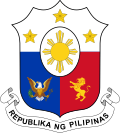Summary
Ahead of the first midterm polls in the country, the two factions of the Nacionalista Party had already reunited. The party went into the 1938 Elections with the confidence of having practically every branch of government under the control of its stalwarts. This reconsolidation of political forces left the opposition in tatters, with the Allied Minorities, a loose caucus of opposition parties, failing to stop the Nacionalista bid.
The elections of 1938 proved to be historic in two ways: It was the first and last time that a single party would secure 100 percent of the seats in the legislature, with the Nacionalistas winning all 98 seats; and it ushered in the years of one-party rule in the country. [2]
This page is based on this
Wikipedia article Text is available under the
CC BY-SA 4.0 license; additional terms may apply.
Images, videos and audio are available under their respective licenses.

